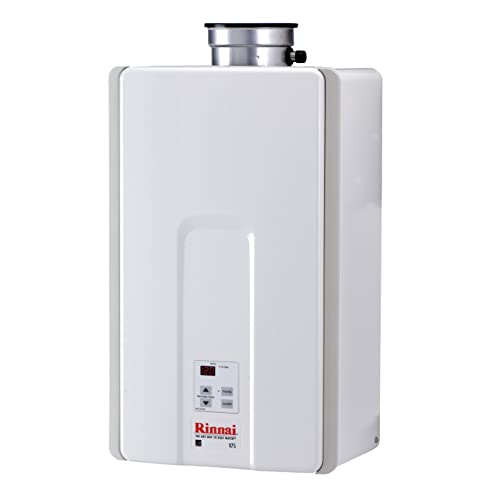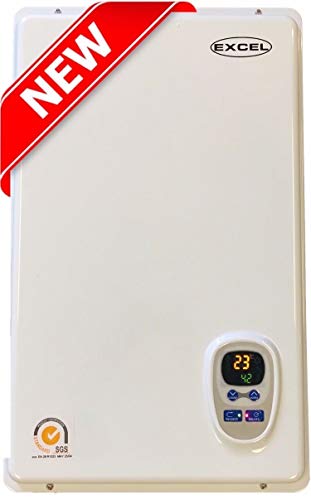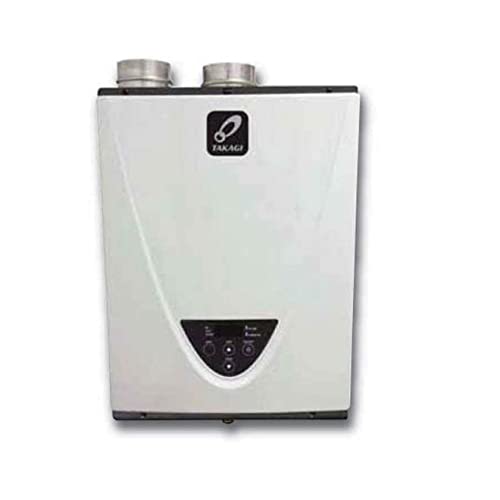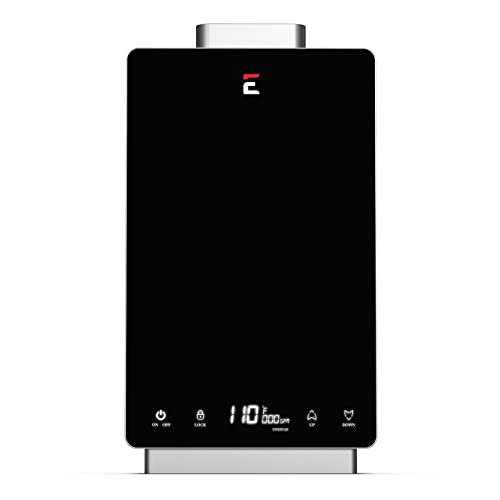There isn’t a day in our lives when we do not use water. Water is an essential commodity and basic need for us. We use it for household chores, personal hygiene, food preparation, and even for relaxation.
Table Of Contents
−- Our reviews for our top 5 picks for natural gas tankless water heater reviews.
- Tankless Gas Water Heaters in a Nutshell
- The efficiency of Tankless Water Heaters
- Different Types of Tankless Gas Water Heaters
- Tankless Gas Water Heater Criteria for Specifications
- Maintenance of Tankless Gas Water Heater
- When to replace the water heater
- How a Water Heater Works
- Tankless Gas Water Heaters: Pros and Cons
- Frequently Asked Questions (FAQs)
- Conclusion
But in areas with generally cold climates, having a water supply that is as cold as the environment is far too difficult and can be a hassle. The good thing is that we now have water heaters to remedy that.
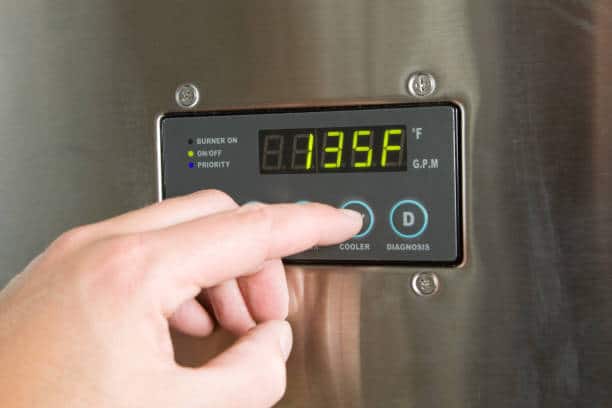
Water heaters use different energy resources. The two most common ones are electric and gas. But for this post, we will focus on the latter. Gas water heaters are preferable because they do not consume energy and are low maintenance.
If you’re in the market for a gas water heater but want to educate yourself first, then you’re in the right place. Read on as we talk about gas water heaters and give some ideas about great models that might suit your preference.
Our reviews for our top 5 picks for natural gas tankless water heater reviews.
The following are 5 models that we think are great choices for Tankless Gas Water Heaters. Check out our reviews for each of them.
1. Rheem RTG-84XLN Natural Gas Tankless Water Heater
If you want a unit that preserves both water and energy while consistently supplying you with warm water, then this might be a good fit for you. It has a flow rate of 8.5 GPM, which is already ideal for one kitchen and two-bathroom house to supply simultaneously.
The waiting time is also not that long for this model to provide you with heated water. Its ability to preserve water and energy will save you from spending more on utility costs. It consumes natural gas, so that makes it eco-friendly as well.
The durable stainless steel material protects the compact size. Installation won’t be much hassle since this water heater is designed for outdoor placement.
Pros
- Does not emit harmful gases
- High-quality material
- Energy-saving and environment-friendly
- Outdoor placement, no need for drilling
- Compact size and elegant look
Cons
- Weight is slightly heavier than other models
2. Rinnai V75in Series HE Tankless Hot Water Heater
This is quite a popular model, and it has lived up to its reputation as an environment-friendly and energy-saving water heating device. The venting system of the Rinnai V75 is built in such a way that it does not emit any harmful gases as it operates.
And it consumes 40% less energy compared to other models because of its temperature lock feature that retains your water at your desired temperature from 98-140 degrees Fahrenheit.
The instruction manual that comes in the package is easy to follow, and the unit setup and maintenance itself is also simple and hassle-free. Other features include a scale detection system and leak detection system that informs you about potential repairs so you can remedy them before they worsen and impair the unit.
The unit has an appealing aesthetic with its classic white color and does take up a lot of space with its petite size. But don’t be fooled by its size because it can still supply enough water for small to medium households.
Pros
- Energy-efficient + temperature lock
- No harmful gas emission
- Smart safety features
- Easy to install
- Neat design
Cons
- Takes some time to heat the water
3. Excel Pro Tankless Gas Water Heater 6.6 GPM
Excel Pro lives up to its name as being a pro at supplying hot water on demand using natural gas. This model’s amount of water varies on the consumption of the appliances it supplies and is connected to.
That is one of the main reasons this saves up a lot of energy: it only operates when needed and therefore does not constantly consume power.
Pair that with the copper heat exchangers used to heat the water, and you end up using around 84% less energy than other conventional water heaters. It also has smart features and an LCD that allows you to set schedules for heating and adjust water temperatures.
All these are simple to navigate even if you do not know much about modern technology.
The unit is wall-mounted and easy to install. You can follow the instruction manual that comes with it, which we found pretty easy to understand as well. It does not take a lot of time to set the unit up.
Pros
- Heat output depends on flow of water
- Energy efficiency thru copper heat exchange method
- LCD display and user-friendly interface
- Hassle-free installation
- Wall-mounted, space saver
Cons
- Temperature is expressed in Celsius
4. Takagi T-H3-DV-N Tankless Water Heater
This is perfect for those large households struggling with their hot water supply that seems to run out easily. With a flow rate of 10 GPM, it has the power to supply hot water to one shower, one sink, a dishwasher, and for laundry simultaneously without any major changes in flow rate.
Your water temperature can reach up to 185 degrees Fahrenheit if you need it for cold days and other household tasks where lukewarm water cannot suffice. It uses natural gas as well, which makes it very energy efficient.
It does not damage the environment with harmful gas emissions because it operates via a condensing system that subjects steam through the water instead of releasing it into the atmosphere as regular gas water heaters do.
Installation is easy, and the product is long-lasting and low maintenance. Everything you need to set it up can be found in the instruction manual.
Pros
- Heavy duty heating power and flow rate
- Suitable for large households with heavy simultaneous consumption
- Condensing system
- Uses natural gas
- Easy installation
Cons
- Expensive
5. Eccotemp i12-NG Tankless Water Heater
This model sports a classic black look that is very aesthetically pleasing. It’s one of the things about this product that caught our eye. It is built lightly as well but with durable material for its casing.
However, it only has a 3 GPM flow rate, so it cannot cater to households with large water consumption. Along with its sleek look, it also rides with the modern technology we have today.
It has an LED display touch screen that displays essential information such as temperature and current flow rate. You can also set it to your desired temperature and maintain your water supply at that level. It also has a child lock feature to avoid any accidental tampering.
This is also a good choice if you are concerned about energy consumption and carbon footprint since this model uses natural gas. Installation can be easily done even without technical knowledge. You have to read and follow the provided instruction manual.
Pros
- Classic, premium look
- Sturdy material
- Great for small households
- LED display and touch screen control
- Eco-friendly through use of natural gas
- Easy installation
Cons
- Cannot supply hot water to many areas at once
Tankless Gas Water Heaters in a Nutshell
From the term itself, this kind of water heater uses gas and does not need a storage tank. It is a smaller and more convenient alternative to those conventional water heaters that store the heated water in a large tank that is readily available for the household. In the case of tankless heaters, hot water is being processed on demand.
They do not constantly consume energy because they only operate when needed. They do not use electricity, only natural gas for their heating.
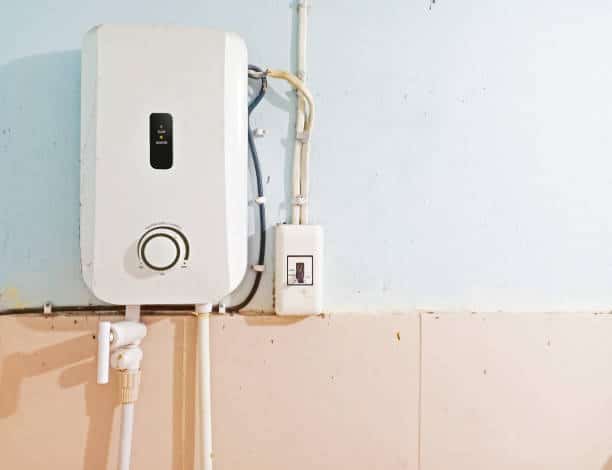
This kind of water heater is perfect for areas with cold climates because the water is heated at the same time you need it, and it comes from a storage tank that has been sitting out for a while and may have gotten colder over time.
The efficiency of Tankless Water Heaters
Convenience and efficiency are the best characteristics of tankless gas water heaters. They are devices that provide hot water on demand. They do not run all the time. They only operate once a water outlet is switched on somewhere in the house. This is a one-time purchase that will give you a long-time benefit.
A unit, provided that it is well-maintained every year, could last you for more than 10 years up to 20 years, including the interior parts. You can maximize the unit’s efficiency with proper cleaning and maintenance.
Gas is a much less inexpensive commodity and less damaging to the environment than electric power. It is also predicted that gas prices will remain consistent for many years while the cost of electric power will increase in the years to come.
In a nutshell, the efficiency of gas water heaters ranges from 87-96%, which are already considered great numbers for this device.
Different Types of Tankless Gas Water Heaters
Tankless gas water heaters come in a few different variants depending on how they heat water.
Non-condensing
Originating from Japan, non-condensing water heaters employ the mechanism of heat exchange when heating water. This is the pioneer device in tankless water heating technology. It typically has a 0.85 efficiency factor which is already good enough but not as good as other variants.
On the bright side, they have good quality and durability. The only downside is that you do not have as much control over the temperature elevation. If left unattended, the temperature could reach extreme levels, which calls for a vent to allow the release of heat.
Condensing
This type also uses heat exchange, but this time, not just one but two heat exchangers are working together to heat the water. The first heat exchanger only has a specific temperature limit.
Suppose your desired temperature for your water is above that level. In that case, the secondary heat exchanger will compensate by further increasing the water temperature until it reaches the desired level.
Condensing water heaters are a huge step up from the first version, with an efficiency level of 94%. PVC vents also work well with this type of heater, which is quite a cheap material that is a small relief to your finances. Condensing heaters operate in large volumes, so it needs to coincide with the amount of your consumption.
Condensing Hybrid
For this one, we may have to disregard the word ‘tankless.’ Condensing hybrids come with a 2-gallon storage container. Though it may not be as large as a conventional storage tank, it is already enough to supply a small household.
The good thing about this type is that you can instantly get heated water from the storage while the heat exchangers process new water. It also works well with vents of PVC material so that it won’t cost you too much.
Tankless Gas Water Heater Criteria for Specifications
Below are some important details you should take note of when doing research for that gas water heater you have your eye on.
Flow Rate
The flow rate should coincide with your household’s water consumption. This is measured in gallons per minute. If there are only a few people in the house and consumption is not that large daily, you can do with a flow rate of 4 GPM. On the other hand, 7 GPM is the average flow rate for households with huge water consumption.
Energy Efficiency
Green is in. When we buy products, choosing those that do not consume a lot of energy but still perform well is always preferable. We aim to reduce carbon footprint and lower energy costs. It is wise to opt for heaters that use energy-preserving mechanisms like condensation technology.
Safety Features
Safety is always a priority. You can be more at ease knowing that the device cannot be easily tampered with by children or has an indicator for leaks and temperature monitoring.
User-friendly controls
With new smart technology emerging in the market today, the devices coming out tend to have user-friendly and easy-to-use navigation and controls.
Capacity
The capacity of a water heater is relative to its size. A large water consumption calls for a large heater. Also, the heating capacity needs to be high to accommodate a large volume of water.
Heating capacity is measured in BTUs or British Thermal Units. 10,000 BTUs can suffice for average households, but commercial establishments or large households may need a capacity that goes up to 1,000,000 BTUs.
Venting
Regardless if the heater is tankless, venting is an important factor to consider when having an indoor gas water heater. Since the device releases many gases whenever it operates, you need proper ventilation, so you don’t accumulate gases in a closed area. You can choose between two kinds of venting for gas water heaters:
Power Venting – requires an exhaust pipe, and the area needs to have a circuit for fresh air circulation
Direct Venting – requires both an exhaust pipe and an intake pipe. The former expels carbon monoxide and other harmful gases while the latter takes in the air.
Condensing vs. Non-condensing
Condensing gas water heaters are simple to install, more efficient in energy consumption, and expel cool air. They can also work well with PVC material rather than the usual metal.
Non-condensing heaters are good for outdoor use because you do not need to worry about air emissions. They are smaller in size and are generally cheaper too. They are suitable for mobile homes, cabins, and other outdoor activities.
Maintenance of Tankless Gas Water Heater
Learn how to maintain your water heater with these easy steps properly:
- Turn off the power source.
- Close the water valves attached to the device.
- Take the caps off the hot and cold water valves’ purge ports valves.
- Attach a hose to each of the valves.
- At a 90-degree angle, twist opens the purge port valves.
- When cleaning the heater, use 2.5 gallons of pure white vinegar. Do not use chemical disinfectants or cleansing solutions.
- Rinse the heater according to the instructions laid out in the user’s manual of your unit.
- Close the purge port valves.
- Detach the hose.
- Replace the caps of the valves
- Start the heater again.
- Turn on one water outlet to clear out any air that may have been trapped inside.
Cleaning and maintaining your water heater can be a one-person job, and you can easily do it yourself. However, we strongly advise that you seek professional assistance upon initial installation.
Setting up the device takes some technical knowledge and considerations you might overlook. It might cost you, but it will save you from future mishaps and problems that may even cost you more.
When to replace the water heater
Manufacturers always put an expiration date on their products. Water heaters are no exemption from that since it is a regulatory requirement. The common lifespan of gas water heaters is 8 to 10 years if it is well-maintained, cleaned regularly, and without major damage.
But this may not be the case if the unit has rust, leakages, unusual noises, and does not efficiently heat water. Those indicate that your water heater needs to be repaired or replaced.
Rust is an irreparable condition. So replacement is the only remedy to this. Leaking and unusual noises may still be repaired by a professional.
Also, if it is unable to function well and the water is not as hot as it should be, you must get it checked out. These may all be minor damages, but if the professional advises you to get it replaced, then it is best to listen.
How a Water Heater Works
We tackled the tankless water heaters above. For this part, we will share some basic information about water heaters in general.
Tank Water Heaters
This is the widely used type, especially for large households and commercial establishments. It comes with a huge storage tank that stocks up on readily available hot water for instant use. It can use both gas and electric power sources. The former costs more at initial purchase but saves a lot of energy in the long run.
Hybrid Water Heaters
This type is the one that uses the least amount of energy out of all the heater types. You can conserve up to 60% of energy with this type. It works via a condenser and evaporator and uses the temperature in the environment to heat the water. An electric pump powers it.
Tankless Water Heaters
Also referred to as on-demand heaters, this type does not come with a storage tank, as we have previously already mentioned. When a hot water tap is opened at a water outlet somewhere in the house, that is the only time when the heater operates. Other than that, it does not consume energy if not in use. Around 34% of energy is saved with this type of water heater.
Tankless Gas Water Heaters: Pros and Cons
If you want to weigh your options, you should know the good and the bad that come with owning such a device.
The Good
- Hot Water On-demand
Do you want hot water right this instant? Worry no more. Your heater will deliver it to you quickly.
- Energy Efficient
Energy efficiency levels can reach up to 96%, as you have already read before. Gas type variants consume the least energy.
- Long Lifespan
Most of these water heaters last for many years. For tankless units, it could serve you for up to two decades at most with the right care and maintenance. It may be a heavy purchase at first, but it will save you a lot of cash in the long term.
- Size
Tankless units are typically smaller and more compact; therefore, they are much easier to place. The best spot to set them up should be nearest to the appliance that consumes the hottest water for convenience and avoidance of delay in the water flow.
- Environment Friendly
These heaters consume gas, but they do not cause severe damage to the environment. Because of their size, they do not consume much energy compared to heavy-duty tank heaters.
- Standby Loss
While tank water heaters constantly consume energy to maintain the temperature of the water inside the storage tank, tankless heaters do not have this problem since they only heat the water that runs through them only when you need it.
- Great for small households with few residents
If you live alone or with not more than 5 people, a large tank unit is just unnecessary and too much of a cost for you, especially if you live in an area with limited space. Tankless heaters do not take up much room. Some of these models are wall-mounted. They also already have a low flow rate for homes with one to two water outlets.
The Bad
- Expensive at initial purchase
You will have to prepare a huge amount at first purchase. Prices of water heaters start at $500 for the low-cost regular ones. Tankless units may cost $1000 or more. You will also need professional assistance installing and modifying your house’s venting system for gas water heaters.
- Temperature inconsistencies
There are instances when tankless water heaters may have inconsistencies in the temperature of the water they deliver, and this may be due to the great demand at once.
- Retrofitting for Venting System
This is necessary for gas water heaters for proper circulation of gas intake and gas emissions. You will have to go through the hassle of modifying the gas vent system of your home because it differs from the preinstalled piping system you already have.
- Other Equipment
This is optional and will depend on the quality of your water supply. For hard water, you may need a water softener to remedy that.
Frequently Asked Questions (FAQs)
How much water can a gas water heater provide?
How much will I save in costs when I use a water heater?
How long is the waiting time for hot water with a tankless water heater?
Which one is better – electric or gas-powered water heater?
Will a tankless water heater be able to supply the whole house?
Conclusion
Water heaters are now almost a necessity for many households, especially those living in areas with generally cold weather.
Whether you’re in the market for a replacement or it is your first time buying a unit, we hope that this post somehow helped you in making a decision. To close this off, we share with you our best bet and most highly recommended model:
Everything you’re looking for in a tankless water heater, from efficiency to quality performance that’s good for small to medium households, you can find in this model.

Jay
Jay is a health and wellness enthusiast with expertise in water quality and nutrition. As a knowledgeable advocate for holistic well-being, Jay successfully manages Type 2 Diabetes through informed lifestyle choices. Committed to sharing reliable and authoritative insights, Jay combines firsthand experience with a passion for enhancing health."


